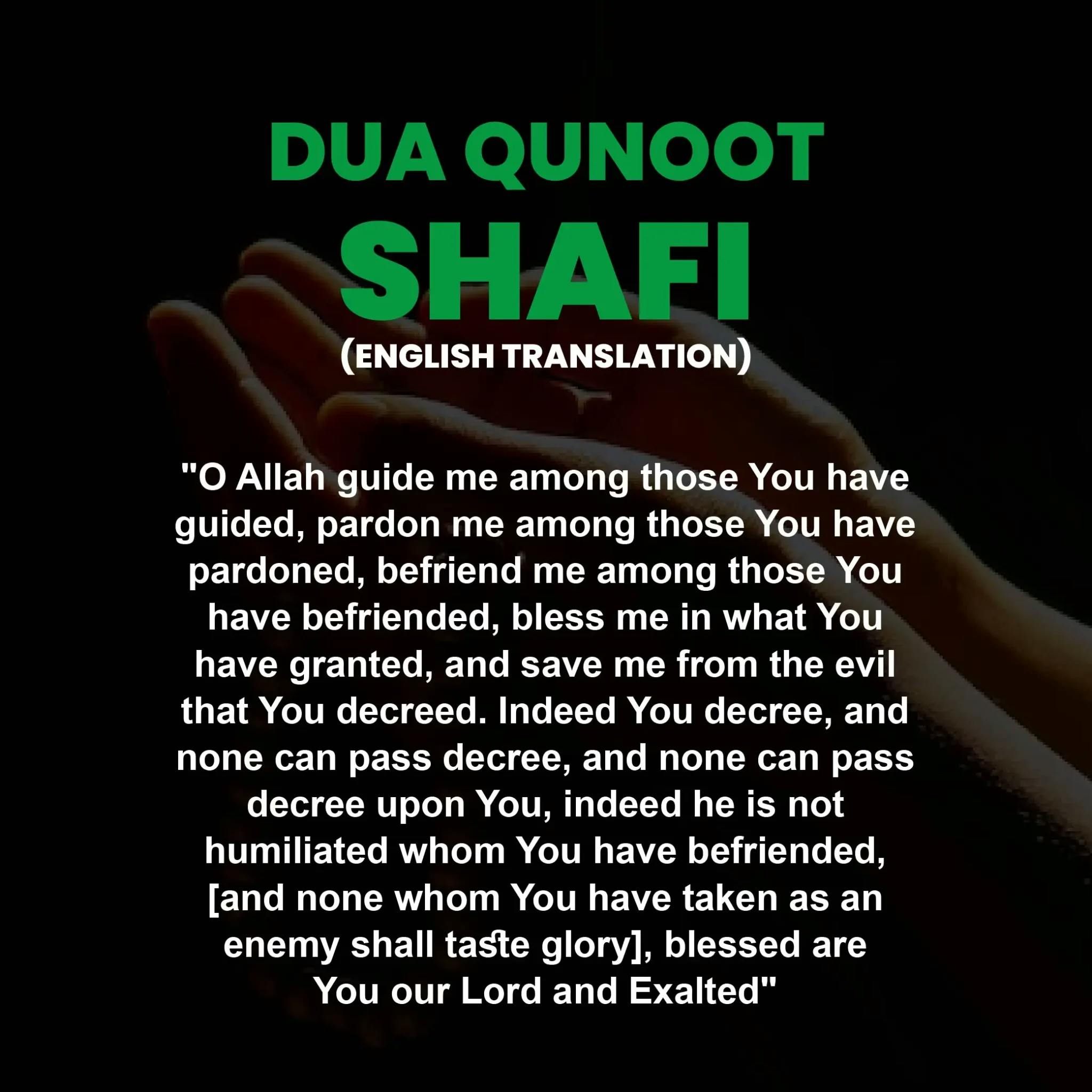
Are you curious to know why people recite Dua Qunoot (دعائے قنوت) ? Well, dua witr was first recited by our Holy Prophet SAW and is one of the most powerful Sunnahs amongst the Muslims. This dua is not mandatory but is the sunnah of our Prophet SAW.
Similarly, It is the best way to build a connection between the supplicator and His Creator. It conveys many messages, such as humbleness, humility, repentance, obedience, and gratitude.
To give you a complete guide on witr dua we have created this detailed guide to let you explore its different forms, translation, transliteration, when to read it along with its benefits. This blog will help you to understand the power of duas for qunoot.
Dua e Qanoot Meaning
The word Dua Kanoot or Duaa e Qunoot is composed of two words, “dua” and “Qanoot” or “kanoot”. The word “dua” means “supplication”, while the word “Qunoot” or “Kanoot” is derived from “Kanata”, which means “standing humble”, “being obedient”, or “surrendering”. Therefore, the Qunoot dua is a special type of supplication that Muslims recite in the Witr of namaz Isha and know as dua for witr.
Basically, Dua Kanood is a supplication; praying means that we are surrendering to Allah and making a promise never to disobey His orders again. It’s a dua we use to ask for help from our Creator during tough times.
2 Versions of Dua al Qunoot:
There are two versions of Qunoot witr dua. Their Arabic, English, and Urdu translations are given below.
Dua Qunoot Shafi


For a few Muslims, Dua e Qunoot Shafi is of much importance. They used to read it while offering their Isha prayer. The first version of Dua e Qunoot in Arabic is written as:
Dua Qunoot Transliteration
For better and deeper understanding of this dua, we provide you classes of Dua e Qunoot Transliteration. By learning this, you can learn about the significance of memorizing this dua.
“Allahumma ihdini feeman hadayt, wa a’fini fiman afait, wa tawallani fiman tawallait, wa barik Li fima atait, wa qini sharra ma qadait, fa Innaka taqdi wa la yuqda Alaik, wa innahu la yadhillu man walait, [wa la yaizzu man adayt], tabarakta Rabbana wa ta’alait”
Translation Of Dua e Qunoot In English
The students can memorize Dua e Qunoot, if they are provided with its proper translation. This is necessary for the student for quick learning and prompt memorization. We are offering you the details of its English translation below;


Dua For Qunoot Urdu Translation
Our online Quran tutors are assisting students by providing lessons for Urdu translation of Dua e qunoot. This will enable the students to memorize this dua promptly by having an understanding of the Urdu language.


Duaa’ Qunoot Hanafi
Muslims practice this dua for seeking Allah’s forgiveness, His aid for performing noble deeds, and, to stay protected from the evil powers. This is narrated in Arabic as;


Dua Qunoot Transliteration
To make our students learn this dua by heart, we also provide its transliteration. Here it is;
“Allahumma inna nasta-eenoka wa nastaghfiruka wa nu’minu bika wa natawakkalu alaika wa nusni alaikal khair, wa nashkuruka wala nakfuruka wa nakhla-oo wa natruku mai yafjuruka, Allah humma iyyaka na’budu wa laka nusalli wa nasjud wa ilaika nas aaa wa nahfizu wa narju rahma taka wa nakhshaa azaabaka inna azaabaka bil kuffari mulhik”
English Translation Dua Qunoot
Dua e Qunoot has great significance in Islam. So, its learning is mandatory for Muslims because this prayer is also included in the Isha Prayer. Its English translation is narrated as;


Dua Qunoot Witr With Urdu Translation
This dua is very important to learn as it has to be read in obligatory Isha prayer. For quick memorization, one must know the clear meanings of this dua. So, he/she can enjoy the benefits of reading this prayer in namaz.


Which Duwaye Qunut of the two is the correct one?
According to Ibn Uqayl al Hanbali (PBUH) the Mustahab version is the “Allahumma ihdini feeman hadayta”. This is because this version was the one which our Prophet SAW used to read as a dua of witr as narrated by al Hassan ibn Ali.
However, Ibn Uqayl al Hanbali also said that if one adds the words to the Mustahab duas, there is nothing wrong with it. If one adds “Allahumma inna nasta inuka” (narrated by Hazrat Umar R.A) to the Dua e Qunoot allahummahdini fiman hadait, then it is correct and acceptable also.
When To Read Dua e Qunoot?
There are different answers to this question according to different Islamic schools of thought.
Hanafi
According to Hanafi, the dua e kunut should be recited in Witr. In some circumstances, it can also be read in other prayers as well. However, there is a condition for it: the Imam should read it loudly, and the Muqtadi will answer it as “Ameen”.
Maliki
According to Maliki, the dua Qunut should be read only in Fajr prayer. There is no dua of Qunoot in the Witr prayer as narrated by him.
Shafi
In accordance with Shafi, the dua e kunoot should only be recited in Witr, specifically during Ramadan. Except for Ramazan, it should only be read in the Fajr prayer, not Witr. Apart from Fajr, you can read it in other prayers under specific conditions.
Hanbali
Based on Hanbali, the duaa e Qunoot should be read in the Witr salah. However, one can also recite it in other prayers in certain conditions. Despite that, you can’t read it in Jumaa prayer.
When to recite Dua for Qunoot in Witr?
Qunut Dua can be recited in the third Rak’ah of Isha prayer after Surah Fatiha and reciting any other Surah. It is recommended that it should be recited with focus from the core of our heart. In this way, we will not only focus on its meaning but also gain maximum benefits from it.
The hadees about when to recite Dua Qanoot given below:
Narrated by Ubayy bin Ka’bt: The Messenger of Allah SAW used to pray witr with three rak’ahs. In the first he would recite: “Glorify the Name of Your Lord, the Most High”, in the second: “Say: O you disbelievers!”, and in the third: “Say: He is Allah, (the) One”. And he would say the Qunut before bowing, and when he finished he would say: Subhanal-Malikil-Quddus (Glory be to the Sovereign, the Most Holy) three times, elongating the words the last time”.
(Sahih (Darussalam) Sunan an-Nasa’i 1699)
Should we read Qunoot dua in Witr before or after Rukuh?
Scholars say that a person can recite dua e qunoot before and after Rukuh as well; both ways are acceptable. Some say that it is better to recite it before Rukuh, but reciting it after Rukuh is not wrong either.
Narrated by Muhammad bin Seereen: Anas was asked, “Did the Prophet (ﷺ) recite Qunut in the Fajr prayer?” Anas replied in the affirmative. He was further asked, “Did he recite Qunut before bowing?” Anas replied, “He recited Qunut after bowing for some time (for one month).”
(Sahih al-Bukhari 1001)
Dua qunoot benefits
There are many spiritual as well as daily life benefits of dawa e qunoot. It helps us achieve success in various parts of our life. Some of them are given below:


Strengthens our faith and relationship with Allah.
It allows us to strengthen our faith by helping us to stay focused and steadfast on what Allah likes. By this dua we beg Allah to add us in His Loved people and guide us. We praise Him and show gratitude for what He has given us. In this way, He acknowledges our gratefulness. Consequently, our relationship with Allah becomes stronger.
Helps us reflect on our sins and repent them.
By standing in front of Allah humbly, we are surrendering to him and begging for forgiveness. As we are begging Allah, there will be fewer chances of doing sins again. In this way, we not only ask forgiveness for the previous sins, but we also repent from committing sins again.
Reduces anxiety and calms our mind and heart.
By surrendering in front of Allah for our sins and repenting from doing more, we become calmer. As we become aware that Allah is with us and we are on the right path, our stress levels decrease. Duaye Kunud improves our mental health by making us humble and better people and telling us that Allah is with us.
Gives us Guidance
In this Dua, we also seek guidance from Allah, so He guides us in every aspect of life and our life changes for the better. Consequently, this leads to a life that He approves.
Increases barakah (Barkat) in our Rizq.
In the Dua Qunoot, we thank Allah for his blessings upon us, and in this way, He increases Brakah in what we have and our Ridq. Allah has promised us He will bless them more who will be grateful for what they have, and He thus fulfils His promise.
Safety from Evil
In this Dua, we ask Allah to keep us safe from any evil, such as sins, problems, or the devil. By doing so, Allah provides us with safety from evil things.
Conclusion:
The Duaa Qunoot holds great importance as Hazrat Muhammad SAW always started reciting this dua in the time of problem or disaster. It has many spiritual as well as material benefits.
However, one should recite it with devotion and humbleness to get the best rewards.
There are many misunderstandings prevailing between us about this dua, and thus, we have tried to clear all those through our blog. If you want to know more about some other duas like this, you can take our Islamic supplications course here.



